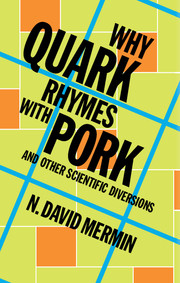Book contents
- Frontmatter
- Dedication
- Contents
- Preface
- Part One Reference Frame Columns, Physics Today 1988–2009
- Part Two Shedding Bad Habits
- Part Three More from Professor Mozart
- Part Four More to be Said
- Part Five Some People I've Known
- 39 My life with Fisher, lecture, Rutgers University, 2001
- 40 My life with Kohn, 2003, updated 2013
- 41 My Life with Wilson, lecture, Cornell University, 2014
- 42 My life with Peierls, unpublished lecture, Santa Barbara, 1997
- Part Six Summing it Up
- Index
42 - My life with Peierls, unpublished lecture, Santa Barbara, 1997
from Part Five - Some People I've Known
Published online by Cambridge University Press: 05 January 2016
- Frontmatter
- Dedication
- Contents
- Preface
- Part One Reference Frame Columns, Physics Today 1988–2009
- Part Two Shedding Bad Habits
- Part Three More from Professor Mozart
- Part Four More to be Said
- Part Five Some People I've Known
- 39 My life with Fisher, lecture, Rutgers University, 2001
- 40 My life with Kohn, 2003, updated 2013
- 41 My Life with Wilson, lecture, Cornell University, 2014
- 42 My life with Peierls, unpublished lecture, Santa Barbara, 1997
- Part Six Summing it Up
- Index
Summary
In 1988, on the 80th anniversary of his birth, there was a conference in Tel Aviv in memory of Lev Davidovich Landau. I announced at the beginning of my own talk—“My Life with Landau”—that I was going to break new ground as a scientific expositor, by following the practice of humanists and reading from a manuscript that I had prepared in advance.
To my surprise Rudolf Peierls, who was sitting in the front row, shook his head emphatically. Professor Peierls disapproves, I told the audience. “Yes,” he said, “this is not a good way for a physicist to give a talk.” “Well,” I said, “it's better than what most physicists do now, reading their talk from plastic sheets while projecting it on a screen.” He looked at me with that sweet half-smile of his and said “That is also a bad way to give a talk.”
In preparing this lecture I reread Bird of Passage, Peierls’ 1985 memoirs [1]. There I discovered that these views, like everything else I ever heard from him, were not casually put forth. They were based on experience and reflection. He says (p. 256):
It is perhaps a weakness that I find it very difficult to lecture from a written text. I cannot just read the text, because reading and sounding as if one knew what one was talking about is a difficult art, which I never mastered. Writing out the text and memorising it is equally difficult. I tried on some occasions to write out a draft, and then to follow the general trend of it, without trying to reproduce the text verbatim. With this, too, I ran into trouble, because in writing the draft I had used some turns of phrase to lead from one thought to another, and I clearly would have liked to repeat these, but as I had varied the wording in talking they would not fit in.
Because of this disability I learned to speak freely…
Nevertheless, as in Tel Aviv in 1988, so in Santa Barbara in 1997, fully mindful of the fitting-in problem, I will try to follow a written draft without trying to reproduce the text verbatim. Today it will be easier because, most regrettably, Peierls is not here with us to explain exactly what is wrong with this approach.
- Type
- Chapter
- Information
- Why Quark Rhymes with PorkAnd Other Scientific Diversions, pp. 346 - 358Publisher: Cambridge University PressPrint publication year: 2016



